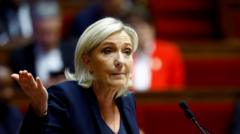Le Pen's political journey, spanning over five decades, is marked by his extremist rhetoric on race and immigration, culminating in his party's transformation under his daughter, Marine.
**Jean-Marie Le Pen: The Controversial Architect of France's Far-Right Movement Dies at 96**

**Jean-Marie Le Pen: The Controversial Architect of France's Far-Right Movement Dies at 96**
Jean-Marie Le Pen, notorious founder of the National Front, reshaped France’s political landscape with his far-right ideologies, leaving a polarizing legacy.
Despite a controversial life steeped in conflict, he became an emblematic figure in French politics, crafting a narrative that ignited both fervent support and vehement opposition, shaping the tides of modern nationalism in France.
Jean-Marie Le Pen, the controversial founder of France's far-right political landscape, has passed away at the age of 96, his family announced. Born in the small village of La Trinité-sur-Mer on June 20, 1928, Le Pen’s dramatic ascent to power began when he established the Front National (FN) in 1972, aiming to consolidate nationalist sentiments in France.
Initially receiving negligible support, his party eventually gained traction through staunch anti-immigration policies, particularly resonating with constituents in the south of France. His political career was marked by incendiary statements, including comments that downplayed the Holocaust, which garnered both a fervent following and widespread condemnation.
Le Pen's prominence surged in the 2002 presidential election, where he shocked the nation by securing a spot in the second round, ultimately losing to Jacques Chirac. This victory prompted widespread protests, revealing the deep divisions within French society regarding his extremist views.
Although Le Pen was pivotal in pushing far-right rhetoric into mainstream politics, the later years of his career saw a fractious relationship with his daughter, Marine Le Pen, who expelled him from the party in 2015 to distance its image from his controversial past. Despite their fallout, Jean-Marie maintained his steadfast views, often dismissing suggestions for moderation as detrimental to the party's strength.
His life story is a testament to a turbulent era in France, characterized by a struggle for identity within an evolving political landscape shadowed by past conflicts. As the nation reflects on his legacy, debates about the normalization of extremist views in mainstream politics continue to reverberate.
Jean-Marie Le Pen, the controversial founder of France's far-right political landscape, has passed away at the age of 96, his family announced. Born in the small village of La Trinité-sur-Mer on June 20, 1928, Le Pen’s dramatic ascent to power began when he established the Front National (FN) in 1972, aiming to consolidate nationalist sentiments in France.
Initially receiving negligible support, his party eventually gained traction through staunch anti-immigration policies, particularly resonating with constituents in the south of France. His political career was marked by incendiary statements, including comments that downplayed the Holocaust, which garnered both a fervent following and widespread condemnation.
Le Pen's prominence surged in the 2002 presidential election, where he shocked the nation by securing a spot in the second round, ultimately losing to Jacques Chirac. This victory prompted widespread protests, revealing the deep divisions within French society regarding his extremist views.
Although Le Pen was pivotal in pushing far-right rhetoric into mainstream politics, the later years of his career saw a fractious relationship with his daughter, Marine Le Pen, who expelled him from the party in 2015 to distance its image from his controversial past. Despite their fallout, Jean-Marie maintained his steadfast views, often dismissing suggestions for moderation as detrimental to the party's strength.
His life story is a testament to a turbulent era in France, characterized by a struggle for identity within an evolving political landscape shadowed by past conflicts. As the nation reflects on his legacy, debates about the normalization of extremist views in mainstream politics continue to reverberate.





















